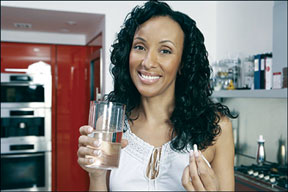 10 things Black women need to know about PrEP
10 things Black women need to know about PrEP
By LaShieka Purvis Hunter
A single daily pill can reduce women’s risk of acquiring HIV through sex by more than 90 percent.
But many African American women don’t know much about pre-exposure prophylaxis (PrEP)—the medication Truvada—taken by people who do not have HIV to reduce their risk of acquiring the virus. So sadly, even though a lifesaving tool to prevent HIV exists, sistahs continue to become infected with HIV at alarming rates.
Which Black women can benefit most from PrEP? Think: women who inject drugs, experience intimate-partner violence or have sex with someone who already has HIV, whose HIV status they do not know, whose fidelity they cannot be certain of or who also has sex with men.
Here are 10 things Black women should know and share about PrEP:
- PrEP is not just for men: Some misconceptions exist that PrEP is only for gay and bi-sexual men, but the drug is an excellent option for women and works well for those who take it according to directions. When taken every day, PrEP can reduce the risk of getting HIV during sex by more than 90 percent and by more than 70 percent through injection drug use.
- Negotiation is not needed: PrEP can help women protect themselves when they are unable to negotiate condom use and/or are having unprotected sex even though they aren’t certain that their partner is HIV negative or monogamous. A woman’s partner doesn’t even have to know she’s taking PrEP. It can also help women who experience intimate-partner violence to reduce their HIV risk, which is elevated.
- The risk of toxicity is low: Some hear “daily pill” and immediately wonder how toxic the drug is. Truvada has low toxicity levels; however, those on PrEP should have their kidneys monitored every three months.
- Side effects decline: Common adverse effects, such as headaches, nausea, diarrhea and vomiting, usually go away within the first month.
- Resistance risk is low: PrEP is for people who do not have HIV; however, some HIV-positive people could end up on PrEP if they don’t know their status. A person who has HIV but who starts taking PrEP is likely to develop drug resistance. So getting tested for HIV periodically and seeing your physician regularly once you’re on PrEP is important.
- Education is the key: According to the Centers for Disease Control and Prevention (CDC), as many as one in three doctors and nurses don’t know about PrEP or are not recommending it to their patients. Some healthcare providers have a bias against PrEP. Therefore, it may be up to you to school your doctor on its benefits and its significance. These tips can help you have a positive and productive healthcare experience.
- PrEP is an option for pregnancy: If you are in a serodiscordant relationship (in which one partner is HIV negative and the other is HIV positive) and you want to conceive, PrEP can be a viable tool for ensuring a safer conception through a process known as PrEP-ception.
- It doesn’t prevent pregnancy: PrEP lowers your risk of HIV, not your chances of getting pregnant. So if you are not trying to have a baby, use a condom or another means of birth control.
- PrEP doesn’t prevent other STDs: If possible, have an open conversation with your partner about how PrEP does not prevent other STDs such as gonorrhea, syphilis and chlamydia. It does not replace a condom or other barrier method.
- Keep getting tested: Just because you’re taking PrEP doesn’t mean that you shouldn’t continue to get tested for HIV. According to the CDC, you should be tested every three months after initiation, but then every six months while on the drug.
LaShieka Purvis Hunter is a freelance writer and editor based in New York.
